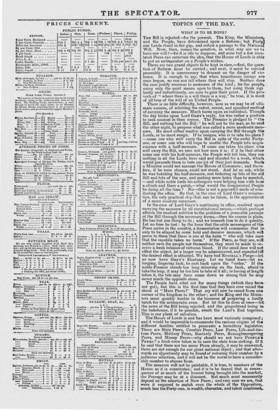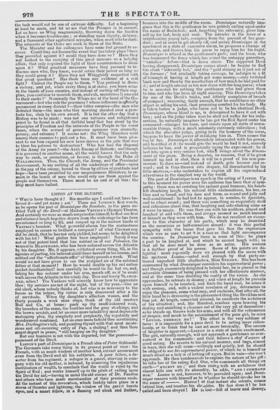TOPICS OF THE DAY.
WHAT IS TO BE DONE?
THE Bill is rejected-for the present. The King, the Minister:), and the People, have determined upon a Reform ; but Forty] one Lords stand in the gap, and refuse a passage to the National Will. Now, then, comes the question, in what way are we to have our will ?-for it is idle to suppose, and none but a few insulated Peers can entertain the idea, that the House of Lords is able to put an extinguisher on a People's wishes. There are two grand objects to be kept in view,-first, the quest tion of Reform must be carried ; and next, it must be carried peaceably. It is unnecessary to descant on the danger of vie. lence. It is enough to say, that when tumultuous risings are once begun, no one can tell where they will stop. Neither does the case justify recourse to measures of the kind ; for the people,, using only the quiet means open to them, but using them vigi lantlby and industriously, are sure to gain their point. If the pre.. verb of " where there is a will there is a way," be true, it is most of all true of the will of an United People. There is no little difficulty, however, sure as we may be of ultimate success, of selecting the safest, surest, and speediest method of carrying the measure. Much turns upon an individual. Though the day broke upon Lord GREY'S reply, his was rather a position to seek counsel in than repose. The Premier is pledged to " the Bill, and nothing but the Bill:" he will not be the man, as he said I the other night, to propose what was called a more moderate measure. He must either resolve upon carrying the Bill through the Lords, or lie must resign. If he resigns, who is to take his place ? -some one who will carry the Bill in spite of the awful Fortyone, or some one who will hope to soothe the People into acquie escence with a half-measure. If some one takes his place who will carry the Bill, we care not how soon it is : if it be that other some one with his half-measure, the People will tell him, they see nothing in all the Lords have said and shouted for a week, which would persuade them to bate one jot of their just demands. Such a Minister could not manage the House of Commons ; and therefore, if he Idvere chosen, could not stand. And let us ask, while he was botching his half-measure, and tinkering up bits of the old Bill and bits of the new, and making more holes than he mended, -and while noble lords his colleagues were helping him with hese a clinch and there a patch,what would the disappointed People be doing all the time ? No-this is not a peaceable mode of conducting the affair. So that, in the case of Lord GREY'S resignation, the only practical step that can be taken, is the appointment of a more resolute successor.
In the case of Lord GREY'S continuing in office, resolved upon • carrying the measure by all constitutional means,-which perhaps • affords the readiest solution to the problem of a peaceable passage of the Bill through the necessary forms,-then his course is plan. He has but one thing to do ; and we beseech him to do it quickly. Let no time be lost : by the hour that the sable messengers of the Press arrive in the country, a fermentation will commence that isonly to be allayed by some bold and decisive measure, which wid prove to them that there is one at the helm " who will take care that the republic takesno harm." If the Peers, as they are, win neither save the people nor themselves, they must be made to receive a fresh infusion of virtuous blood. If the small dose will not effect the object, let a larger one be administered, and repeated tilt the desired effect is obtained. We have had RUSSELL'S Purge-let us now have GREY'S Electuary. Let no timid fears-let no longing, lingering look, be cast back upon the "order." lithe noble Premier stands too long shivering on the bank, afraid to: take the leap, it may be too late to take at it all ; or having at length taken it, the tide may have come down so strong that he may never reach the opposite shore. The People have cried out for many things (which they have not got), but this is the first time that they have ever raised the shout of "More Peers r That cry will now be raised from one corner of the kingdom to the other ; and the King and the Ministers must quickly buckle to the business ot preparing a lordly batch for the aristocratic oven. But let this be done at once-let. the news of the Bill being rejected, and the gingerbread being in the bakehouse, if it be possible, reach the Land's End together. This is our plank of salvation. The House of Lords is and has been most variously composed ; and it would be impossible to enumerate the various origins of the different families entitled to procreate a hereditary legislator.. There are State Peers, Courtier Peers, Law Peers, Life-and-fortune Peers, Military Peers, Bastardy Peers, Boroughmongering Peers, and Money Peers-why should we not have PEOPLE'S PEERS? a fresh crew taken in to save the state from sinking. If it be said that there are too many Peers already, it may be answered, there are not enough for our great national object ; and that after-wards an opportunity may be found of reducing their number by a judicious selection, and it will not be the worse to have a considerable number to choose from.
The measure will not be palatable, it is true, to numbers of the House as it is constituted ; and it is to be feared that in consequence of so much of the honour being brought into the market, the Peerage may be at a discount. But much must necessarily depend on the selection of New Peers ; and very sure we are, that were it required to match even the whole of the Opposition,. much less the Forty-one, in wealth, character, and talent combined,. the task would not be one of extreme difficulty. Let a beginning at least be made, and let us see that the Premier is in earnest. Let us have no Whig magnanimity, throwing down the burden when it becomes troublesome ; or standing upon dignity, delicacy, and a thousand other egotistical scruples, when work is to be done. The interests of the Order are sunk in those of the State.
The Minister and his colleagues have some lost ground to recover. Could they not foresee the event that has taken place ? have .thoy provided against it ? could they have done so ? Have they not -looked to the carrying of this great measure as a holyday affair, that only required the light of their countenances to shine upon it ? What practical measures have they pursued to influence men who, they knew, would retain their power as long as they could grasp it ? Have they not Whiggishly coquetted with this great question ? Has there been any evidence of a real fight? Cannot the People say to them, "You pretend to desire .8 victory, and yet, when every thing is at stake, you leave arms in the hands of your enemies, and instead of cutting off their sup -plies, you continue to nourish them, and (oh, monstrous !) you add to their ranks ?" Nominally the Whigs are at the head of the Government—but who rule the provinces ? whose influence is officially .paramount in every district ?—their bitter enemies—the men who defeated them—the men who this morning shouted over a prostrate foe, slain by his own sword. It is but the other day that a Bishop was to be made : was-not one virtuous and enlightened priest to be found in all that faithful band that has stood by the principles of Freedom and the interests of the People in the worst times, when the reward of generous opinions was obscurity, penury, and calumny ? It seems not: the Whig Ministers went among their enemies to pick out a foe. It must have been pleasant to see him expand his new lawn sleeves in the gale that was to blow his patrons to destruction! Who has had the disposal of the Army for years ?—the Arch Enemy of Reform ; and though it is governed in another name, all the world knows that the only way to rank, or promotion, or favour, is through the Duke of WELLINGTON. Thus, the Church, the Army, and the Provincial Government, to say nothing of all the underlings of office—spies in the pay of the enemy, bound to them by all ties of gratitude and hope—have been permitted by our magnanimous Ministers, to remain in the hands of men who could only use them against the people and themselves. There must be an end of all this : the ship must have ballast.



























 Previous page
Previous page